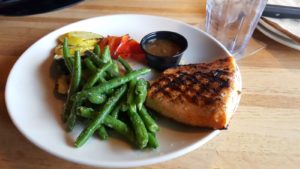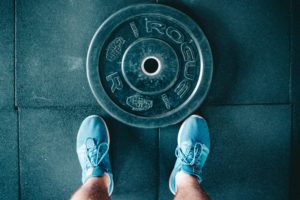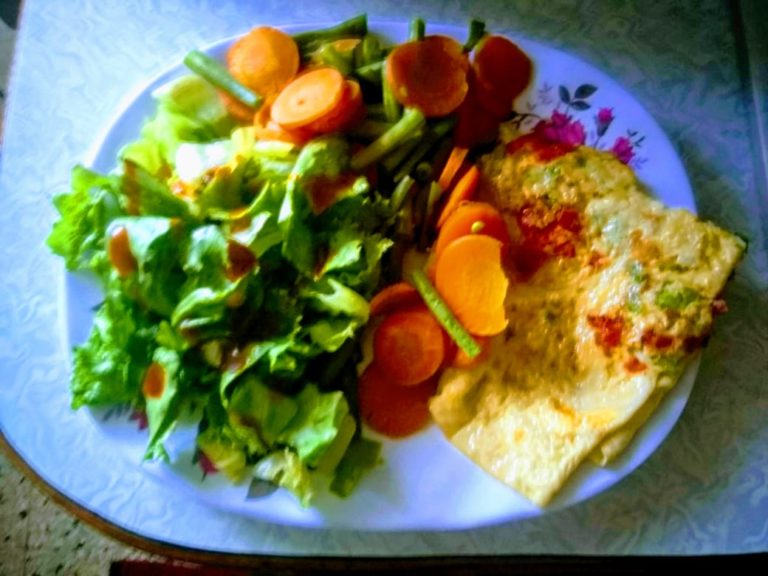WHY AM I REGAINING THE WEIGHT I LOST?
BY: FITZ-GEORGE RATTRAY
 Three of the most common questions I get are, “when can I eat normally again”, followed by, “can I eat more now that I have lost weight?” and finally, you probably guessed it, “why am I regaining weight?”
Three of the most common questions I get are, “when can I eat normally again”, followed by, “can I eat more now that I have lost weight?” and finally, you probably guessed it, “why am I regaining weight?”
Objectively these questions all have simple, common sense, obvious answers:
You can eat “normally” whenever you feel you need to, but if you hope to meet a health based goal, or hope to maintain a life filled with the highest probabilities for optimum health and pain free living, the “normal eating” which took you away from your ideal will never be advisable. You will have to find the mindset to establish a new normal in your life, FOR, your life.
Once you have lost the pounds of excess fat that you, your nutritionist or your medical practitioner have decided on, your diet will include more calories than was required to lose the extra fat. This, however, will be less than what you ate to gain the weight in the first place.
If you are regaining weight after you have reached your goal and have been hoping to maintain, then, I hate to seem droll, but you are clearly ingesting too many calories relative to your calorie consumption, and perhaps you are also ingesting too many empty calories.
WHAT HAPPENS TO YOUR ENERGY REQUIREMENTS WHEN YOU LOSE EXCESS FAT
Once you have lost the extra pounds you will invariably be lighter. Fat does not require many calories to be maintained on your body, as opposed to muscle which utilises energy, even at rest. You are now carrying a lighter load and will burn less fuel to do the same work.
Imagine a train, the fuel is the calories, the engine is the muscles and the cargo is the load, including muscles and fat.
If you have a bigger engine and more cargo you will burn more fuel. When your fat levels are reduced you will burn less fuel. That is obvious and significant. But there is another highly significant factor. Invariably, the process of fat loss will also result in muscle loss, mainly because parts utilising fat for energy will trigger the use of some muscle for energy. Your body will also react to the reduction of cargo, in the form of reduced fat, and will, as nature has designed it, reduce the engine to match the new load.
This reduction in muscle will cause a measurable drop in your Basal Metabolic Rate or BMR. This is a measurement on how many calories you metabolise at rest and is reflective of your overall rate of calorie consumption.
So, now you have a smaller engine hauling a lighter load, taking in more fuel will just cause more fuel to be stored, at times at a faster rate than before.
WHAT DO I DO TO KEEP THE WEIGHT OFF?
About now you may be wondering if this means you must eat little or nothing for the rest of your life. No, this does not have to be the case.
Most importantly, do not return to your old ways. You recognised that your previous habits were not serving your chances for wellness. Even if you were always health conscious, and only ate healthy foods, or always read labels and avoided certain unhealthy foods, the fact is, your fat levels were rising and threatening your life. Your new way of eating got you to a better place, even if it seemed challenging. Try to understand the changes and learn from the differences, know that your old habits and principles were not good enough for your future, create a new mindset for your own future.
REEVALUATE YOUR OLD HABITS ON CONCEPTS
They have either only barley helped you, were beginning to cause you discomfort and promising worse or, they were setting you up for a lifetime of suffering. Take objective lessons from your own experiences and find a new normal.
FIND A BALANCE
Knowing and understanding (with your coach or on your own) what has worked for you is necessary for maintaining your changes
DO NOT TRY TO KEEP LOSING WEIGHT INDEFINITELY
Be patient. Constant weight loss is neither healthy nor sustainable. It can result in genuine metabolic trauma and sabotage your long-term goals. Healthy weight loss takes time, and learning balanced maintenance also takes time.
DECIDE ON A MODE WEIGHT RANGE
No one’s weight is constant, underwear can add .2 lbs. to your weight, shoes 2 lbs., water 2 lbs. or more, one cheat meal, 2 – 6 lbs. in one day (on the scale). Traveling, special occasions, the occasional mood, all these factors can affect your weight and your fat levels. You must never be daunted by an increase, do not go crazy and “lose it”. The best way to manage the realities of living and weight changes is to allow yourself some flexibility. Your mode weight is what your weight is most of the time. Attempt to allow yourself to exist with a mode RANGE. A 5 -8 lb. weight range that you live with. This will take some of the pressure off, while keeping you living healthily.

CONTROL YOUR INTAKE
Stick to your portions, stick to healthy nutritious foods and avoid empty calories and simple carbs, choose water. Remember how controlled your portion sizes were for your weight loss. How much clean protein, healthy oils, nutritious vegetables and fruits you had while limiting simple carbs and sugars. Understand that changing those ratios by too much will jeopardize your lifelong goals.
MONITOR YOUR CHANGES AND ADJUST YOUR INTAKE ACCORDINGLY
Do not gradually slide your scale under the counter. There are debates about regular weighing. Studies continue to maintain that people who keep track of their body weight, maintain better than those who don’t. We are not objective, the scale is, and with all the sitting most of us do, it is a known mechanism to relay how much our weight is changing.
 DO SOLID WEIGHT RESISTANCE TRAINING, BUILD MUSCLE AND FIND WAYS TO BE MORE ACTIVE.
DO SOLID WEIGHT RESISTANCE TRAINING, BUILD MUSCLE AND FIND WAYS TO BE MORE ACTIVE.
Muscle burns energy. Research shows that heavy WEIGHT RESISTANCE TRAINING at least three to four days per week may cut your risk of heart attack by 40 to 70 percent. It will also help in strengthening bones, stabilizing joints, improve balance and stability. It assists with fat level management. Muscle burns energy even when you are at rest. You do not need to overdo it, just build muscle, stay healthy.
REVERSE DIETING
This is one of the methods our InteKai maintenance system employs. It may be difficult to understand, but it works. After a weight loss diet you have a new unfamiliar body. It is not even the body you had at that same weight before. To learn the responses of this new body, a gradual increase in intake and analyzing of your responses is essential, becoming stable and energetic at your new weight is critically important. This process can easily take as long as a year or two, and properly done it can contribute to a lifetime of wellness.
DO NOT ALLOW ANY LIFE CHANGES TO CREATE A “REASON” FOR GETTING OFF TRACK
Understand that anything you are doing, anyone who is depending on you, any sorrow or tragedy will dement the best, healthiest version of you. You are the Captain of your ship, and, you have to eat regardless of what is happening, and an unplanned, poorly habituated, randomly nourished version of yourself is not the Captain, your life’s ship deserves.
REINFORCE YOUR NEW HEALTHY HABITS. STICK TO THE FOODS WHICH YOU KNOW KEEP YOU HEALTHY
Don’t start becoming too creative with your food choices. Relying on your own understanding, food cravings or people around you. The path you have been on got you to a healthier place, stay as close to it as possible.
KEEP PLANNING AND MAINTAIN YOUR ROUTINE
Intekai maintenance provides this service, but if you are on your own ensure that you plan your meals and maintain your eating routine.
ALWAYS SEEK SUPPORT
We cannot readily see how much we lack objectivity. Having a friend, family member or a coach by your side on this journey can be priceless. Do not withdraw into your shell of old destructive patterns in plain sight; just be open and honest with someone, and accept their understanding and objective support.
GIVING UP IS NOT AN OPTION
If you are on a fat loss and wellness journey or have achieved your goals, understand its lifelong nature. Avoid setting out on a path of wellness only to throw it away when you are, one year, two years, five years or ten years older, more vulnerable and in a higher risk bracket.
Intelligently stay on your path. If you are regaining or have regained the weight you have lost, never be ashamed, shy or timid. There is no room for criticism, self or otherwise in habituation recovery. For most of us the recovery process is up and down. Giving up is the only true mistake. You know what was required to lose those fat pounds in the first place, keep embracing your solution and use the tools of monitoring, support, evaluation, patience and balance to keep your wellness on track. Remember, you cannot change without changing.








An excellent encouraging article. As one that had regained and must now return to healthful balanced eating.
It is always advisable to join the maintenance programme and continue to get the support and encouragement, as the weight loss process is very different from the maintenance process. It’s always important to continue to weigh even after you have lost your weight and you are in maintenance, this is the main tool apart from your clothes that will assist in quickly letting you know if you are still within your mode weight.
Thanks Rosene. We are happy you are enjoying the articles. Share them with family and friends who you believe will benefit from the ITK Way…
Relevant mind boggling and instructive article